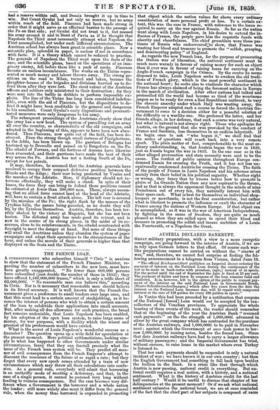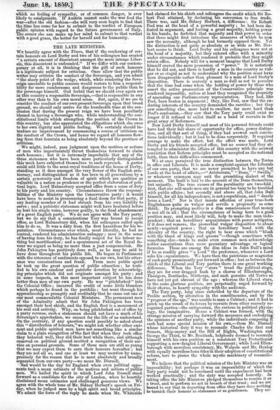AUSTRIA DECLARED BANKRUPT.
GREAT military preparations, with a view to a more energetic campaign, are going forward in the interior of Austria, if we are to rely upon German letters to that effect. Of course such war- like preparations cannot be carried on without the " sinews of war,' and, therefore, we cannot feel surprise at finding the fol- lowing announcement in a telegram from Vienna, dated. June 16.
"The official Reichegesetzblett publishes an Imperial decree ordering the payment of interest on the National Loan during the continuance of the war to be made in bank-notes with premium, (agio,) instead of in specie. For the period until the end of September the Agio is fixed at 25 per cent. The payment of duties and taxes by coupons of the loan remains valid and unaltered. It is, however, left to the option of the public to request pay- ment of the interest on the said National Loan in Government Bonds, (Staats-Schuldverschreibungen,) which after five years from the date the interest on the National Loan becomes due, will be repaid with compound interest at the rate of 128 gulden for every 100 gulden in specie."
In Venice this had been preceded by a notification that coupons of the National [forced] Loan would not be accepted by the tax- collectors of the Venetian provinces. To appreciate the whole bearing of these events of the week, the reader should remember that at the beginning of the year the Austrian Bank " resumed cash payments " on the the strength of 1,000,0001. advanced in silver by the great company which has contracted for the purchase of the Austrian railways, and 1,000,0001. to be paid in November next; against which the Government at once took power to bor- row 2,000,0001. by issuing notes, besides the forced loan. Since that date Austrian railways have had to carry a larger allowance of military passengers ; and the Imperial Government has tried, without success, to raise loans in the market where even Turkey is listened to.
That her cash payments should be suspended is only a natural incident of war ; we have known it in our own country; but then the English Government had something to fall back upon besides the bullion in the Bank. In a crisis like that through which Austria is now passing, national credit is everything. But na- tional credit requires a real nation, with a history, and a national sentiment. What is the history of Austrian credit for the last half century ? Would it be useful to discuss that chapter of her delinquencies at the present moment? Or if we ask what national sentiment animates the national heart, we are at once reminded of the fact that the chief part of her subjects is composed of races
Which no feeling of sympathy, or of common danger, is ever likely to amalgamate. If Austria cannot make the war feed the war—after the old fashion—she will very soon begin to find that the time has come for her to submit to the verdict of European public_ opinion with regard to the future government of Italy. The sooner she can make up her mind to submit to that verdict with a good grace, the better for herself and for humanity.



































 Previous page
Previous page